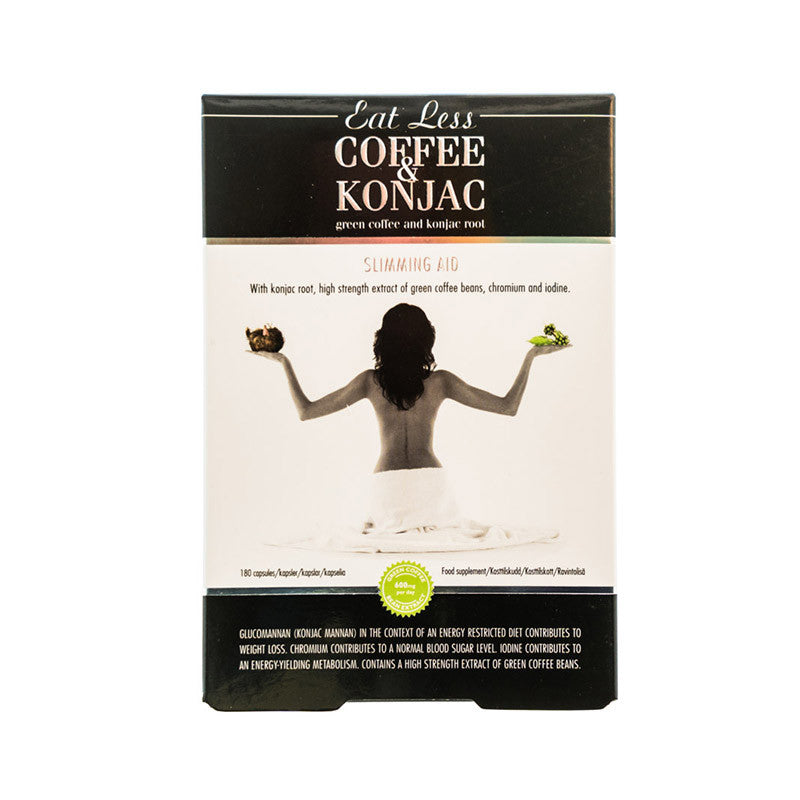FREE UK Delivery when you spend over £50
Immitec Health
Coffee and Konjac
Coffee and Konjac
5.0 / 5.0
(5) 5 total reviews
Couldn't load pickup availability
Eliminate Food Cravings
With this incredible supplement that utilises the Konjac root to form an expandable natural fibrous jelly in your tummy to make you feel fuller and experience less food cravings for sugary foods.
The effect is you experience far less hunger and food cravings enabling you to stick to your healthy eating plan with ease.
Coffee & Konjac is the market's only supplement that contains the combination of extracts from green coffee beans and three active substances approved by the EFSA * with established weight loss effect; Glucomannan, chromium and iodine. * EFSA: European Food Safety Authority.
The active substances in Coffee & Konjac are well documented in area of weight loss and control. These substances have never combined in one product before.
Extract of green coffee
The extract of green coffee included in Coffee & Konjac consists of at least 50% chlorogenic acid. Already in the 1960s it was discovered that coffee drinking reduced the blood sugar level, and that this effect is not solely attributable to the caffeine effect. Later discovered that the effect was due to chlorogenic acid, a phenol found in green (unroasted) coffee beans and other plants. The content of chlorogenic acid in coffee decreases markedly when it is roasted. Chlorogenic enzyme glucose-6-phosphatase. Since this enzyme plays an active role in the degradation of starch to sugar, so klorogensyran contributes to a significant reduction in the excretion of glucose-dependent insulinotropic peptide (GIP). The intake of chlorogenic acid thus inhibiting the body's ability to absorb glucose. Control studies have subsequently shown that the extract of green coffee included in Coffee & Konjac ™ is an effective carbohydrate blocker that reduces the absorption of glucose in the blood, and thus constitutes an effective tool for weight control.
DOCUMENTATION
Chlorogenic
Since long, the consumption of coffee has been associated with bodyweight- and blood sugar regulation. Already in 1968 published Feinberg et al. (1) a report on an experimental study of the effect of coffee consumption on including blood sugar levels. The subjects had to consume controlled amounts of glucose with and without the instant coffee. The study showed that consumption of coffee caused a significant decrease in glucose levels compared with the same glucose intake without coffee.
Naismith et al. (2) followed up with experimental studies published in 1970, where the effect on the blood sugar level of coffee with and without caffeine was examined under controlled periods. During the periods of intake of caffeinated coffee, as well as caffeine-free, decreased glucose levels significantly compared with control periods without coffee - without changes in insulin levels. Their conclusion was therefore that coffee consumption contributed to lowering blood sugar, and that this effect could not be explained by caffeine, or at least not only of caffeine.
Consequently, the blood sugar lowering action, and the consequent dependence of weight loss, attribuerats the effect of chlorogenic acid. This coupling has been studied by several research teams. 1989 published Welsch et al. (3) an American study that examined the effect of various phenols, including chlorogenic acid, the uptake of D-glucose in rats. The study demonstrated that chlorogenic acid effectively inhibits rat glucose uptake.
These early work was later followed up by, among others Hemmerle et al. 1996 (4), and Arion et al. 1997 (5). They tested the hypothesis that chlorogenic enzyme glucose-6-phosphatase, and hereby also the digestion of starch to glucose, as well as the transport of glucose into the bloodstream. All these studies show that chlorogenic acid effectively inhibits the uptake and transportation of glucose into the bloodstream. The latter two studies were commissioned by the German-American pharmaceutical company Hoechst Marion Roussel.
In a later British study examined 2002 Johnston et al. (6) the effect of chlorogenic acid on blood sugar lowering and insulin secretion after intake of caffeinated and decaffeinated coffee, linked to meals with high carbohydrate content. This study shows no statistically significant reductions in blood sugar levels or insulin levels, but indicates that a highly significant reduction in the secretion of glucose-dependent insulinotropic peptide (GIP). GIP plays an important role in the regulation of glucose rehydration scale and speed. This study thus emphasizes the theory that the intake of chlorogenic acid inhibits glucose uptake.
As a result of numerous studies that indicate a link between the coffee consumption and the risk of type-2 diabetes, conducted McCarthy 2004 (7) a study that coats the positive connection between klorogensyraintag and type-2 diabetes.
In a review of available studies of coffee consumption in relation to risk of diabetes and obesity pulls Greenberg et al. (8) concluded that there is strong evidence that coffee consumption in itself contributes to weight loss by thermogenic effects due to increased energy metabolism. This effect seems to be mainly due to the caffeine in coffee. In addition to this, it seems that coffee consumption increases the metabolism of fat and lipolysis, and that these effects, together with thermogenesis, contributing to weight control - but to a greater extent among non-obese sufferers than in people who suffer from obesity.
In light of the evidence available to coffee and chlorogenic acid would constitute promising components for weight control preparations, instructed Med-Eq execution of clinical studies of the effect of Coffee Slender ™ (a dietary supplement containing chlorogenic acid) in body weight regulation. In the first study caused the uptake of glucose Coffee Slender induced a significant lowering of blood sugar levels over a period of 120 minutes after consumption, compared with a control drink which contained the same amount of glucose. The usual instant coffee, both with and without caffeine, had no blood sugar lowering action.
In the second study tested the effect of Coffee Slender of body weight, compared to the usual instant coffee, in a double-blind study. Here once more, caused Coffee Slender significantly greater weight loss relative to placebo (9).
Regardless of these studies were conducted in an Italian study of fifty volunteers, experiments with extracts of green coffee, similar to the one included in Coffee Slender. This study produced similar effects. It shows that chlorogenic acid provides significantly greater reductions in body weight compared with the control group, and the difference versus placebo is statistically significant (p = 0.01) also follows (10). In a recent double-blind, placebo-controlled, longitudinal study of twelve volunteers could be the effect of chlorogenic acid on weight control again verified. While the daily dose in the studies of Coffee Slender was 3 & nbsp; x & nbsp; 100 & nbsp; mg chlorogenic acid, as used in this study 2 & nbsp; x & nbsp; 350 & nbsp; mg and 3 & nbsp; x & nbsp; 350 & nbsp; mg. While this was a significant loss with body weight and body fat percentage, both in the high dose in low dose given (11).
The effect of chlorogenic acid (5-kaffeoylkininsyra and 3.5-dikaffeoylkinin acid), the suppression of diet-related accumulation of body fat, can be explained by its inhibitory effect on the SREBP-1c and similar molecules. This has recently been shown in an animal study (12).
Glucomannan
Glucomannan is a water-soluble dietary fiber extracted from the roots of the konjac (Amorphophallus konjac). Glucomannan is considered to prolong the defecation time, which increases satiety, reduces body weight, inhibits the absorption of foods that seem cholesterol and glukosförhöjande, reducing the rise in blood sugar after meals, prevents the formation of cholesterol in the liver, and facilitates cholesterol-containing bile acids to pass out of the body as waste.
Several mechanisms have been proposed to underlie dietary fiber intake conjunction with bodyweight, at the side of the fibers as filler substance replaces energy and nutrients in the diet. The fibers increase the volume of digestive tract content, reduces bowel movement need and promotes satiety, while reducing the absorption of nutrients, and affects the secretion of digestive hormones, with effects on combustion and storage of fat (13).
The European Food Safety Authority, EFSA has assessed the available clinical documentation relating to the use of glucomannan as dietary fiber in several areas. It notes that there is enough evidence to assert that the substance can facilitate weight loss as well as the regulation of blood sugar levels after meals (14).
In a more recent meta-analysis (15) of the available studies concluded that glucomannan appears to have a beneficial effect on the overall cholesterol, the amount of LDL cholesterol and triglyceride levels, as well as on body weight and blood sugar levels without affecting HDL cholesterol and blood pressure.
Jod
Iodine is an important component of the thyroid hormones which are known to affect metabolism. Iodine deficiency due to inadequate presence in food generally slows down the metabolism. In itself therefore contributes to the supply of iodine body weight regulation.
EFSA has assessed the available documentation on the effects of iodine in different physiological contexts and concluded that there is sufficient evidence to argue that iodine helps to maintain normal thyroid function, thyroid hormone production and energy metabolism(16).
Crom
EFSA has assessed the available documentation on the effects of chromium for sustained health and concluded that there is sufficient evidence showing that chromium is essential for the body's utilization of nutrients to function normally, and for a steady blood sugar level (17).
It was found that chromium improve the metabolism of carbohydrates and fats, especially in people with type 2 diabetes. The tracer can regulate insulin action, and to facilitate cellular uptake of glucose (18).
References
- Feinberg LJ, Sandberg H, De Castro O, Bellet S “Effects of Coffee Ingestion on Oral Glucose Tolerance Curves in Normal Human Subjects” Metabolism 1968; 17(10):916-22
- Naismith DJ, Akinyanju PA, Szanto S, Yudkin J. “The Effect in Volunteers of Coffee and Decaffeinated Coffee on Blood Glucose, Insulin, Plasma Lipids and Some Factors Involved in Blood Clotting” Nutr. Metabol. 1970; 12: 144-151
- Welsch CA, Lachance PA, Wasserman BP. “Dietary phenolic compounds: inhibition of sodium –dependant D-glucose uptake in rat intestinal brush border membrane vesicles.” J Nutr 189;119:1698-1704
- Hemmerle H, Burger HJ, Below P, Schubert, Rippel R, Schindler PW. Paulus E, Herling AW Chlorogenic acid and synthetic chlorogenic acid derivatives: Novel inhibitors of hepatic glucose -6-phosphate translocase. J Med Chem1997;40:137145
- Arion WJ, Canfield WK, Ramos FC,Schindler PW, Burger HJ, Hemmerle H, Schubert G, Below P, Herling AW. Chlorogenic acid and hydroxynitrobenzaldehyde; New inhibitors of hepatic glucose 6-phoshatase. Arch Biochem Biophys1997;339:315-32
- Johnston KL, Clifford MN, Morgan LM: Coffee acutely modifies gastrointestinal hormone secretion and glucose tolerance in humans: glycemic effects of chlorogenic acid and caffeine Am J Clin Nut 2003; 78:728-33.
- McCarty MF “A chlorogenic acid- induced increase in GLP-1 production may mediate the impact of heavy coffee consumption on diabetes risk” Medical Hypothesis 2005; 64: 848-853
- Greenberg JA, Boozer CN, Geliebter A “Coffee, diabetes, and weight control” Am J Clin Nutr 2006: 84: 682 – 93
- Thom E “The Effects of Chlorogenic Acid Enriched Coffee on Glucose Absorption in Healthy Volunteers and Its Effect on Body Mass When Used Long-Term in Overweight and Obese People” J International Med Res. 2007; 35: 900 – 908
- Dellallibra SSA O, Lemaire B, Lafay S. ”Le Svetol®, unextrait de café vert décafeiné, induit une perte de poids et augmente le ratio masse maigre sur masse grasse chez des volontaires en surcharge pondérale. 2006 Phytotherapie; 4: 1-4
- Vinson JA, Burnham BR, Nagendran MV “Randomized, double-blind, placebo-controlled, linear dose, crossover study to evaluate the efficacy and safety of a green coffee bean extract in overweight subjects” Diab, Met Syndr Obes:Targets and Therapy 2013; 5:21-27
- Murase T, Misawa K, Minegishi Y, Aoki M, Ominami H, Suzuki Y, Shibuya Y, Hase T “Coffee polyphenols suppress diet-induced body fat accumulation by downregulating SREBP-1c and related molecules in C57BL/6J mice” Am J Physiol Endocrinol Metab 2011; 300: E122-E133
- Salas-Salvado J, Farre X , Luque X, Narejos S, Borrell M, Basora J, a Anguera A, Torres F, Bullo M, Balanza R “Effect of two doses of a mixture of soluble fibres on body weight and metabolic variables in overweight or obese patients: a randomised trial” Brit J Nutrition (2008); 99: 1380–13
- Scientific Opinion on the substantiation of health claims related to konjac mannan (glucomannan) EFSA Journal 2010;8(10):1798
- Sood N, BakerWL, Coleman CI “Effect of glucomannan on plasma lipid and glucose concentrations, body weight, and blood pressure: systematic review and meta-analysis” Am J Clin Nutr 2008;88:1167–75
- Scientific Opinion on the Substantiation of Health Claims related to Iodine EFSA Journal 2009;7(9): 1214
- Scientific Opinion on the Substantiation of Health Claims related to Chromium EFSA Journal 2010;8(10): 1732
- Wysocka E, Cymerys M, Mielcarz G, Bryl W, Dzięgielewska S, Torliński L “The way of serum chromium utilization may contribute to cardiovascular risk factors in centrally obese persons” Arch Med Sci 2011; 7, 2: 257-263
SUCCESS STORY
Nina
 Sweet tooth and hunger were my worst enemies!
Sweet tooth and hunger were my worst enemies!
Ever since adolescence, Nina has been fighting a constant sugar cravings. Despite the regular long walks and an active life is the pounds crept on. It was only when she started eating Coffee & Konjac that trend reversed, with the weight loss results.
Nina has always felt the frustration of having a sweet tooth. It became a habit to satisfy it with goodies and snacking. While it is important for her to stay in shape and feel good to cope with any challenge. But despite the long walks and active leisure, the pounds crept on.
Periodically, Nina has tried different diets, but instead of losing weight, she has known hunger and suffered from a sustained cravings. Nina got the hint to try Coffee & Konjac.
- I was skeptical and did not really believe it would work, but Coffee & Konjac gave me quickly a positive result, says Nina. Sweet tooth and hunger disappeared and now I eat smaller portions. It has resulted in that I lost weight and gained a several centimeters smaller waistlines. It is amazing nice to have regained his match weight and I feel both energized and stronger in the process. I will definitely continue with Coffee & Konjac and also recommend others to try.
Share
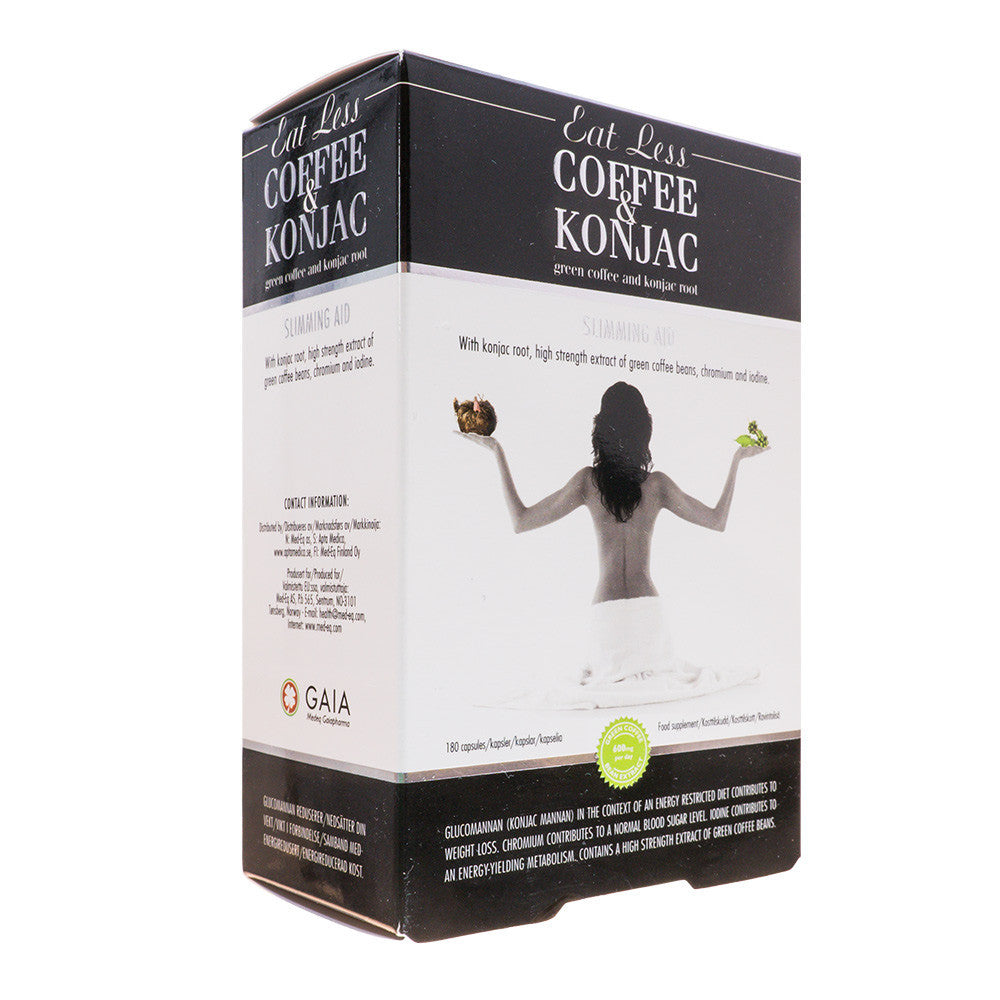
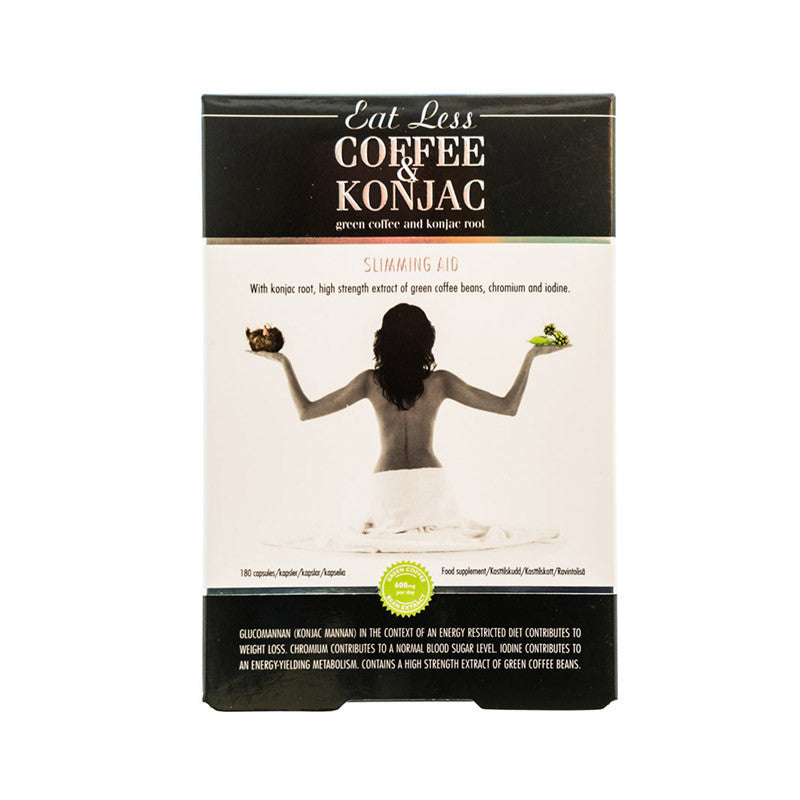
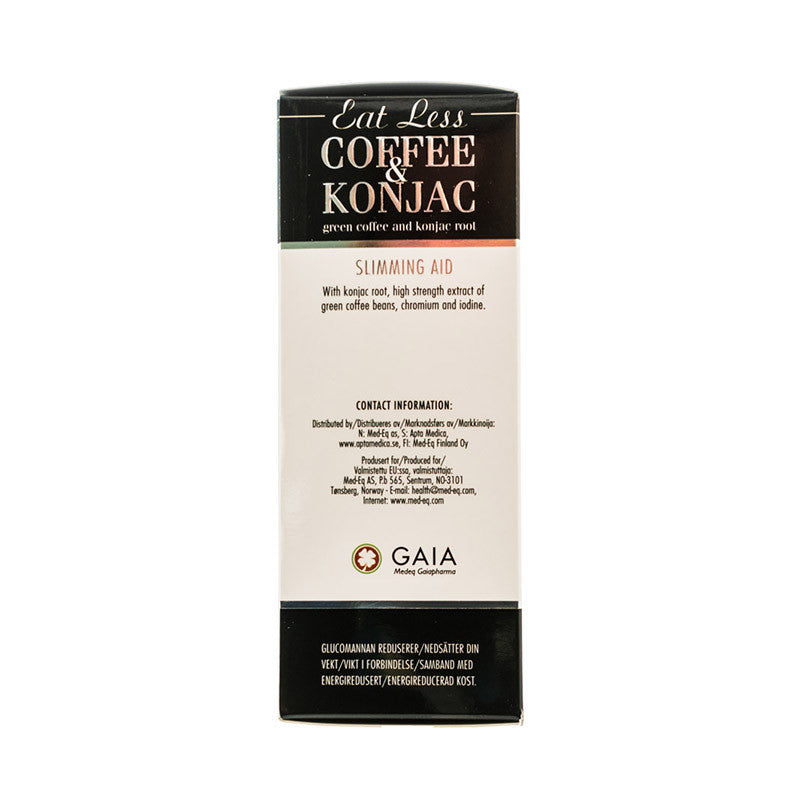
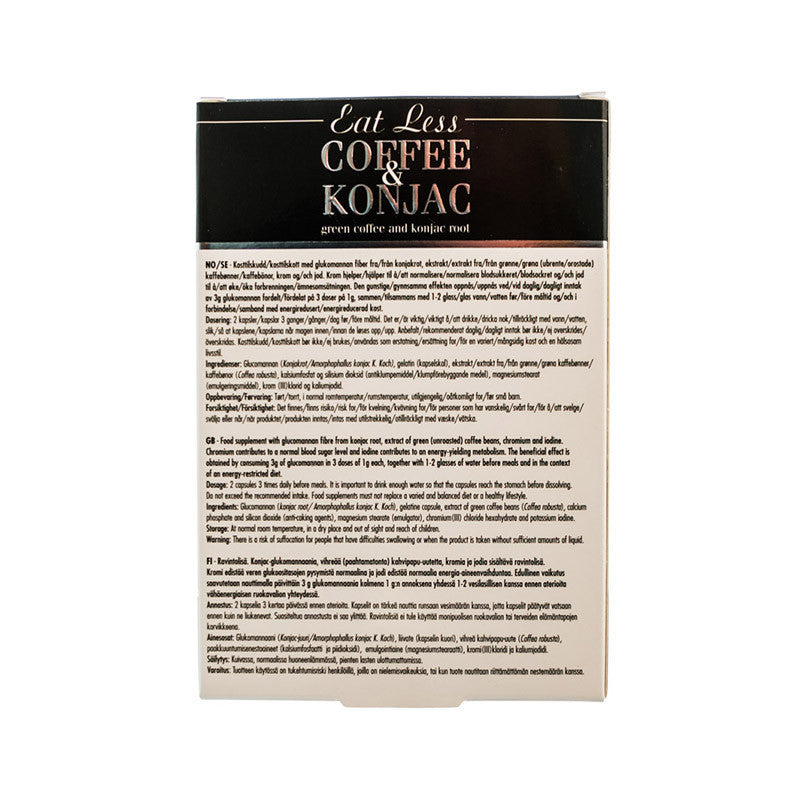
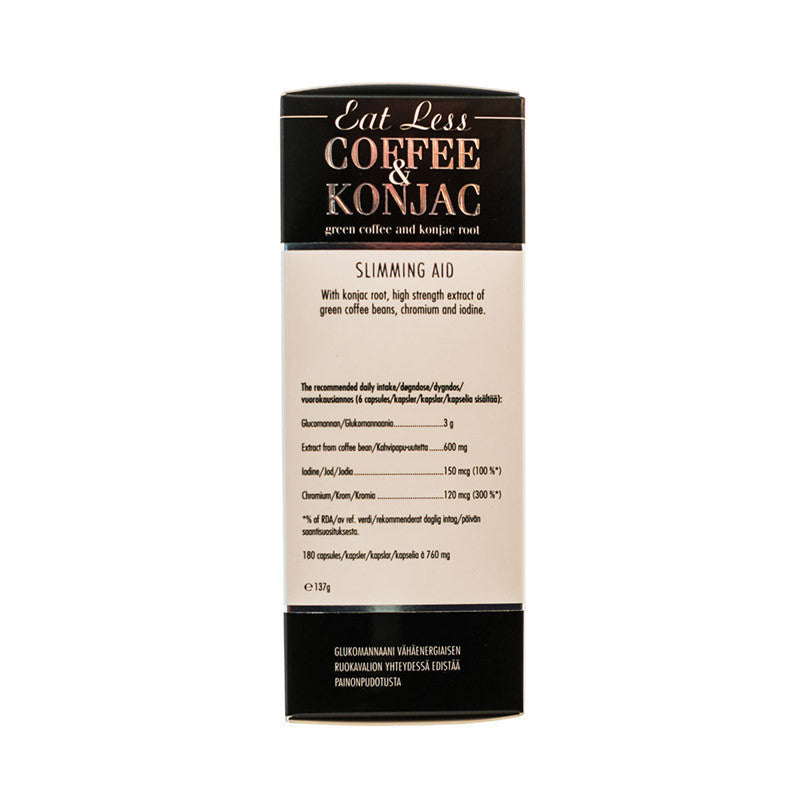
- Reviews
- Questions
Thank you for submitting a review!
Your input is very much appreciated. Share it with your friends so they can enjoy it too!
Lost 8lb in 3 weeks
I've been overweight for many years and attempted various diets. A friend recommended the product to me and so far it has proved extremely effective at keeping hunger at bay. I've lost 9lbs in a few weeks and I'm delighted.
Debra Fish
The product arrived quickly and I was eager to get started. It is really easy to use and has stopped me feeling hungry. Lost 5lb so far with more to come.
Lost 3/4 stone with this
brilliant product i will not be without it now
Godsend!!
Literally incredible how this handles hunger and cravings.... love love love this product!!
Cravings Gone!
Fabulous product i take this whenever i need a snack or a sugary treat, drink a big glass of water and my cravings are gone so quickly and stay gone until its meal time.


